The Centers for Disease Control et Lysenkoism
It's the reason Congress banned CDC gun research
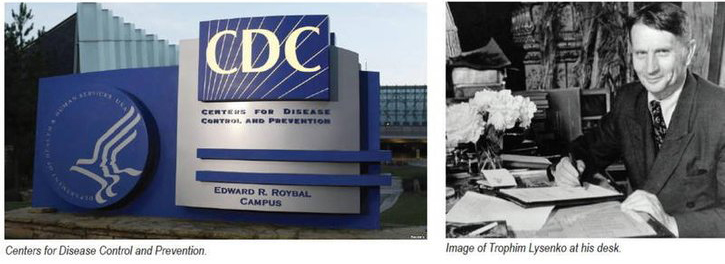
By Dan Gifford
First published in Firing Line magazine 2018
The 22 year ban on gun violence research at the Center's For Disease Control (CDC) has been lifted. That a constitutional Right would be examined as a possible disease is political sophistry to be tackled another day. But the casuistry for this day is that the ban was initiated by the late Republican Congressman Jay Dickey when the head of CDC research said he intended to conduct intellectually dishonest studies that validated his own anti firearm fetishes despite a trove of prior legitimate research that contradicted his biases.
As the 1981 Carter administration's massive study attempt to prove guns cause crime and murder conceded in conclusion: "It is commonly hypothesized that much criminal violence, especially homicide, occurs simply because firearms are readily at hand and, thus, that much homicide would not occur were firearms generally less available. There is no persuasive evidence that supports this view ... a compelling case for gun control cannot be made."
Q.E.D, most would say.
But not for zealots with a political agenda. "We're going to systematically build a case that owning firearms causes deaths," said CDC research head Patrick O'Carroll said in a 1989 Journal of the American Medical Association issue. His successor, Mark Rosenberg, went further. He told Rolling Stone in 1993 he "envisions a long term campaign, similar to tobacco use and auto safety, to convince Americans that guns are, first and foremost, a public health menace." He then told the Washington Post in 1994 "We need to revolutionize the way we look at guns, like what we did with cigarettes. It used to be that smoking was a glamour symbol — cool, sexy, macho. Now it is dirty, deadly — and banned."
That's Lysenkoism.

The phrase takes its name from Joseph Stalin's favorite botanist, Trophim Lysenko. He claimed crops germinated according to Marxist principles and then verified his view with rigged research. Those principles held that crops can pass on characteristics they have allegedly acquired from its environment to its offspring. That is also known as the inheritance of acquired characteristics or soft inheritance and is a principle Leon Trotsky and other Marxists expected to produce a better species of human when "perfected" by a socialist environment.

Stalin liked that and put Lysenko in charge of Soviet agriculture. Around 3,000 Soviet scientists who pointed out that Lysenko's ideas were absurd and the reason for mass starvations were shot by Stalin.
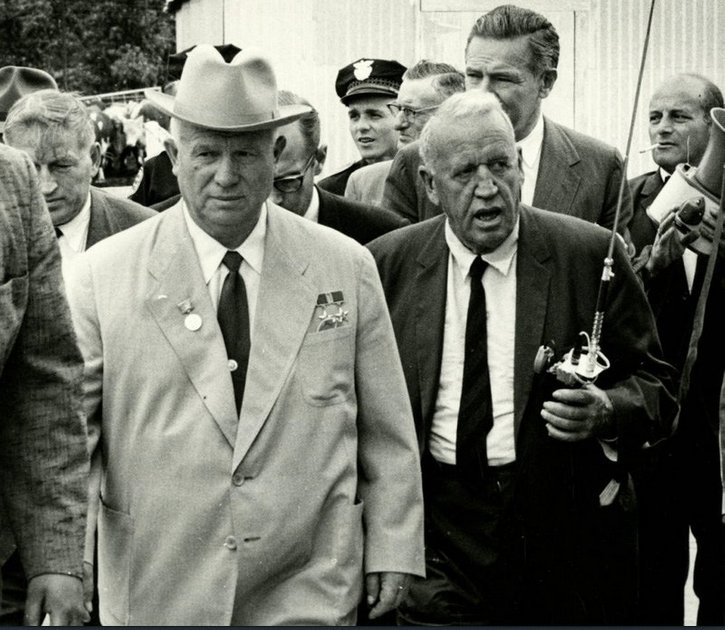
So powerful was the ideological appeal of Lysenko's Marxist doctrine that Nikita Kruschev, the Kremlin leader who followed Stalin, kept Lysenko in his position into the 1960s even though his doctrines had produced nothing but 40 years of crop failures and millions of dead Russians.
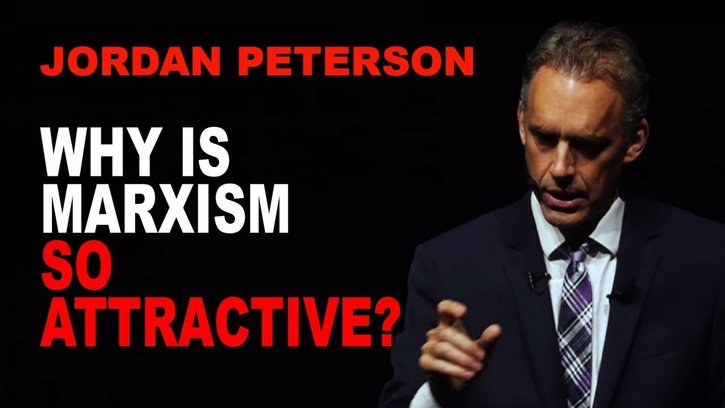
Like Lysenko's ideological adherence to Marx, Canadian professor Jordan Peterson says many among our public health and academic establishment hold a befuddling enamoration for a Marxist based, post modern humanist belief in the plasticity of human nature holding that environmental objects like guns cause violence and that removing them will cause humans to evolve into better beings. That notion comports with an atheism about human nature and has prompted an evangelical spreading of noble lies about firearms the prevaricators apparently believe will save lives.
That's the likely reason for the concocted popular belief that a gun in the home is 43 times more likely to be used to kill a family member and another that gun ownership during colonial times was rare. Confirming the power of the meme, both remain widely repeated and believed even though both were exposed as fabricated frauds. Emory University professor Arthur Kellermann made up the 43 times myth in a CDC study skewed to produce that result while Emory's Michael Bellesiles made up the second and was stripped of his professorship and many awards thanks to the efforts of researcher Clayton Cramer.
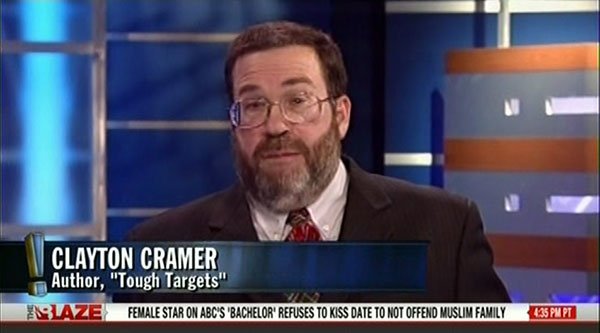
Undeterred in the pursuit of forcing round ideological pegs into factual square holes, Barak Obama commissioned a study after the Sandy Hook school shooting to disprove what the Carter study and those of well known independent scholars like Gary Kleck and John Lott had found. Obama's study findings received almost no news mention because their failure to refute did not fit the created media narrative that armed good guys were no defense against armed bad guys.
Points worth noting:
* "Studies that directly assessed the effect of actual defensive uses of guns have found consistently lower injury rates among gun-using crime victims compared with victims who used other self protective strategies."
* "Almost all national survey estimates indicate that defensive gun uses by victims are at least as common as offensive uses by criminals," concludes the report."
* "There is empirical evidence that gun turn-in programs are ineffective."
Q.E.D. again? No, more misdirection.
"In the area of what works to prevent shootings, we know almost nothing" maintained previously quoted CDC official Mark Rosenberg shortly after the San Bernardino shooting in 2015. Rosenberg's comment is a bit of study funding bait political theater played out after every mass shooting that includes misplaced diatribes against America's favorite "gun nut," Wayne La Pierre of the NRA.
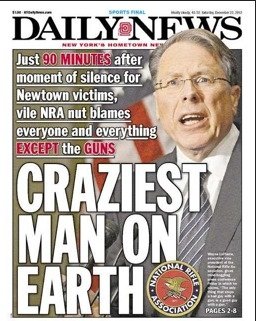
I see such refusals to accept reality and bark up wrong trees as egregious examples of ideological based intellectual dishonesty. The reality is, nothing about people and guns has changed since the following piece of mine was published in a 1993 issue of the Baltimore Sun. It's worth reading again.
"The latest congressional head count indicates some sort of gun-control legislation is likely to pass. If it does, will we be safer? Not that I can see.
Through gun-control laws, Congress will have strengthened its precedent for curtailing the Bill of Rights on public safety grounds.
Don't see the linkage?
Consider the move by Sen. Paul Simon, D-Ill., and others to censor television violence. Last I looked, the First Amendment said ''Congress shall make no law . . . abridging freedom of speech . '' But people act-out what they see, goes the argument, so speech as theatrical violence is a public safety hazard.
I'm no fan of guns or TV violence. But every other right against abusive government is vulnerable to the same reasoning. The constitutional right of due process of law is supposed to protect us against a police state, but when vicious criminals are set free on constitutional technicalities, isn't public safety at risk?
As for gun control equaling crime control, that's long been disproved.
Who said this? ''It is commonly hypothesized that much criminal violence, especially homicide, occurs simply because firearms are readily at hand and, thus, that much homicide would not occur were firearms generally less available. There is no persuasive evidence that supports this view.''
The NRA? Hardly. That's the conclusion to the Carter administration's 1981 report on the relationship between firearms and violence. The lead researcher for that report now writes that "a compelling case for gun control cannot be made ." Virtually all intellectually honest scholars who have seriously studied the subject agree. Surprised by their findings? So were they.
When the Carter administration funded Tulane sociologist James Wright and Peter Rossi of the University of Massachusetts to review all research done on violence and firearms and make policy recommendations, the researchers -- who disliked guns and thought the avail- ability of firearms, especially handguns, was to blame for criminal and domestic violence -- expected to verify the relationship found by Lyndon Johnson's Eisenhower Commission report in 1969. They quickly discovered that work and others to be ''result-oriented.''
Even most Eisenhower Commission researchers have recanted. Ted Gurr now says ''The irony of gun-control proposals is that they would criminalize much of the citizenry but have only marginal effects on criminals.'' Staff criminologist Hans Tuch concludes:''Guns do not elicit aggression in any meaningful way. Quite the contrary, these findings suggest that high saturations of guns inhibit illegal aggression.''
More recently, University of Washington professor Brandon Centerwall confessed in the American Journal of Epidemiology: ''I did not begin this research to exonerate handguns, but there it is -- a negative finding to be sure. .. . . If you're surprised by my findings, so am I.''
Ditto for Florida State University criminologist Gary Kleck: ''The U.S. has more violence than other nations for reasons unrelated to its extraordinarily high gun ownership.''
Are there academics with the opposite view? Of course. Law professor Franklin Zimring still holds with the original Eisenhower Commission findings he helped compile. But the research supporting those views is increasingly being recognized within the academic community as flawed.
Arthur Kellerman of Emory University continues to churn out studies favoring handgun bans. His latest, claiming homicides are more likely to happen in households with guns, is getting most-favored media attention, but is a joke among researchers who know the subject. Dr. Kellerman concludes there's ''no protective benefit from gun ownership,'' but he has factored out successful defensive uses. We aren't even told whether the gun in the home was the one used in the homicide.
In fact, the majority of domestic-violence killings, a St. Louis University study found, occur after numerous police calls for prior incidents and often involve criminal activity. The Chicago Detective Homicide Report for 1992 noted more than 75 percent of those committing homicide have criminal records, while more than 65 percent of their victims had them. Those figures comport with national ones.
So if firearms are not the catalyst for violence, why are so much time and money being wasted trying to restrict or ban them? Journalistic dishonesty is one reason, political demagoguery another. Gun control has become a fetish, an obsessional shibboleth diverting attention from the more unyielding causes of American violence. Those include social policies and societal trends which have institutionalized poverty, the drug culture, deteriorating family structures and the notion that individuals aren't responsible for their actions.
Wouldn't it be better for Sarah Brady and the National Rifle Association to join forces and follow Professor Kleck's suggestion? ''All parties to the crime-control debate would do well to give more concentrated attention to the difficult, but far more relevant, issues like how to generate more good-paying jobs for the underclass, which is at the heart of the violence problem.'"
------------
Dan Gifford is a national Emmy-winning, Oscar-nominated film producer and former reporter for CNN, The MacNeil Lehrer News Hour and ABC News.
###